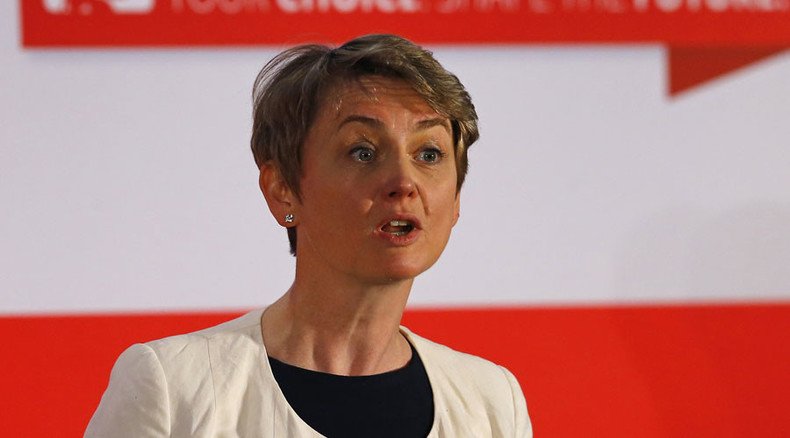No more military action against ISIS until Iraq War report published – Labour’s Cooper

Britain must not pursue further military action against Islamic State targets until the findings of the Chilcot Inquiry into the Iraq War are published, Shadow Home Secretary Yvette Cooper has said. Critics say the 8-year war was key to the rise of ISIS and fragmentation of Iraq.
Speaking in the House of Commons, Labour leadership contender Cooper called on MPs to pass a motion demanding the controversial report be published before the close of 2016.
The prospect of air strikes against ISIS in Syria was raised before parliament's summer recess, with Shadow Defense Secretary Vernon Coaker insisting Labour MPs are prepared to work with the government to defeat the terror group.
Cooper said parliament was being asked “all of the time” to consider further military intervention against Islamic State (fomerly ISIS/ISIL). But she insisted no action should be taken until the findings of the Chilcot Inquiry are published.
The probe into Britain’s role in the 2003 Iraq war was launched by Sir John Chilcot in 2009, and completed its evidence-taking in 2011. Delays have supposedly resulted from a so-called “Maxwellization” process, which offers those criticized an opportunity to respond to allegations.
Speaking on Saturday, Prime Minister David Cameron called the delays “immensely frustrating.”
“People listening to this will think, ‘Why on earth can’t the prime minister order this thing to be published?’ I can’t. It’s an independent inquiry. It has to be that way,” Cameron told the BBC.
Set a deadline on the Chilcot Inquiry into the Iraq war, says Yvette Cooper http://t.co/ywjPPUrmF5@Independentpic.twitter.com/JTyQmUUXDg
— Ian Geldard (@igeldard) August 17, 2015Amid speculation that Chilcot’s report might not be published until next year, families of soldiers killed in Iraq have threatened legal action.
Speaking Friday, relatives of deceased servicemen called the delay “morally reprehensible.” They said they would give the inquiry’s chairman just two weeks to confirm the report's release date before they pursue legal action.
Observers say Cooper, who is trailing frontrunner Jeremy Corbyn in the Labour leadership contest, could present Cameron with a way out of the standoff by proposing to work with him.
“As Labour leader I would suggest to David Cameron that we jointly bring a motion to the House of Commons calling for the prompt publication of the report, ending the so-called Maxwellization process, and setting a cutoff date that parliament would be invited to vote upon,” she said on Sunday.
Reflecting on her decision to support then-PM Tony Blair’s decision to invade Iraq in 2003, Cooper conceded he was “wrong” on the invasion and the military strategy pursued there afterward.
“It distracted from the crucially important conflict in Afghanistan that had depleted Al Qaeda there,” she said. “And the disorder, instability and lack of management of the aftermath extended the violence and conflict.”
Under Blair’s New Labour government, Britain invaded Iraq in 2003 alongside US forces. MPs, campaigners and citizens have long argued the brutal war divided Britain and severely tarnished Blair’s decade-long leadership.
In early August, Corbyn told the BBC that Blair should stand trial for war crimes if the Chilcot Inquiry ruled he violated international law by invading Iraq. Corbyn, whom polls say is on course to win the leadership election by a landslide, has said he has no doubt the war was illegal.
Earlier in 2015, Chilcot said the report’s release date would be delayed until after the general election amid concerns its findings could unfairly influence its outcome.
Draft reports of the probe’s conclusions rattled the British establishment in December 2014, with senior Whitehall figures battling to sanitize its findings. Excerpts from the report, some hundreds of pages long, were dispatched to those whose conduct during the conflict is under investigation.
One well-informed source told The Times that the report’s findings were much more scathing than expected, and had prompted a legal firestorm in the heart of the UK establishment.
Experts also warned in 2014 that the omission of potentially crucial correspondence between Blair and former-US President George W. Bush raised questions about the Chilcot inquiry’s legitimacy. They expressed specific concern over a culture of secrecy in Britain’s defense and security service establishment.
Senior figures central to the Chilcot inquiry, including Blair, are expected have their legal fees paid by the UK taxpayer. Expert analysis suggests the cost of the Chilcot Inquiry could surpass £11 million.












